
No. 13, 2023 | 5 October 2023
Go to:
From FRSA's Acting Executive Director
This week we opened the call for abstracts for the FRSA National Conference 2024! We welcome abstracts that speak to the Conference theme – Family & Relationship Services – Valued now and into the future. There are six streams to align abstracts to – The first 1000 days, schooling years, children at the centre, relationship breakdown and re-partnering, family domestic violence and across the lifecourse. We are always impressed by the quality of work shared at conference and encourage members and stakeholders to get your abstracts in. Abstracts are due by 5pm, Monday 6 November.
We are excited to be hosting a webinar next week on the findings of an economic evaluation FRSA commissioned the Centre for International Economics (the CIE) to undertake. This work assesses the value that family and relationship services bring to clients and the broader community, including government funders, and reveals a significant return on investment, both socially and financially, from these services. For every dollar of government funding allocated to Family Law Services and family and relationship support services, there is a return on investment ranging from $7.85 to $8.67. Services lead to significant improvements in family functioning, mental health, well-being, personal and family safety, age-appropriate development, and community participation.
As well as the striking results of the analysis, which show the clear value of family and relationship services, we were excited that the CIE was able to access relevant DEX data to underpin the cost benefit analysis. We know that our Members, and the sector more broadly, commit considerable time reporting into the Government’s performance reporting system – the Data Exchange (DEX) and we were delighted to see a return on this investment! Being granted access to DEX data greatly enriched CIE’s analysis. We also see it as a step toward making a publicly owned dataset available to the broader research and policy community. This will, in turn, better serve the interests of Australian children, families and communities.
This webinar is open to all interested stakeholders – registration details are below.
Pre-polling has opened around the country for the referendum on an Aboriginal and Torres Strait Islander Voice, and Australians will have their say on Saturday 14 October. FRSA supports a Voice to Parliament, which we see as integral to ensuring that the wisdom, views and experiences of First Nations peoples are truly heard and inform policy and legislative change on matters that affect them. We join with others in the community sector to accept the generous invitation from First Nations peoples and take the next step towards that better future.
In closing I note that 10 October is World Mental Health Day. It’s a reminder to “Look after your mental health, Australia”, this year the campaign is encouraging Australians to focus on “Awareness, Belonging, Connection”.
Kind regards,
Dr Robyn Clough
FRSA Acting Executive Director
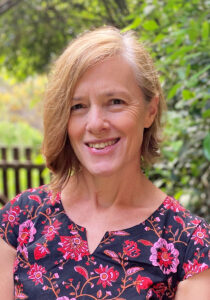
FRSA National Conference 2024 - Call for Abstracts now OPEN!
FRSA invites you to submit an abstract to present at the 2024 FRSA National Conference. The Conference will be held at the Pullman Melbourne on the Park on 13-16 May 2024.
The theme for the FRSA National Conference 2024 is Family & Relationship Services – Valued now and into the future.
Each and every day, family and relationship services help facilitate changes in the lives of the children, adults, families and communities they work with. These might be barely perceptible micro-changes. They might be lightbulb moments. They might be multiplier or cascading effects that are difficult to attribute to any one intervention or service. Change, as the saying goes, is the only constant and reflecting on the role our sector plays in facilitating positive change is an important step in understanding where concepts, practices and interventions can be maximised and replicated and where we might explore new possibilities, new ways of thinking and of doing to make the greatest impact.
FRSA and the sector has been investing time and energy in successfully painting a picture of the ‘value’ of our services. Whilst the value of services is presented in monetary terms in the cost benefit analysis work, we know that the impacts and benefits underpinning this work bring about real benefits and changes to people’s lives.
The FRSA National Conference 2024 provides a platform to showcase and learn from on the ground practice, policy, and research. It will provide an opportunity to consolidate an understanding of our sector’s ‘value add’ and identify the strengths we can build on and the opportunities we can harness.
This year we will come together to share and explore our sector’s value and our sector’s potential.
The FRSA Conference presents a great opportunity for you to showcase the work that you do. We welcome abstracts that speak to the conference theme – Family & Relationship Services – Valued now and into the future.
- The first 1000 days
(e.g. the preconception period (preconception to birth), the birth of a child, impact on family relationships and transitions into parenting). - Schooling years
(e.g. school readiness, transitions into and across primary and secondary schools/school years, young people with significant caring responsibilities and transitioning out of school into training, tertiary education or employment). - Children at the Centre
(e.g. child-focused and child-inclusive practice, supporting children’s participation in policy development, children’s participation in service design and evaluation, child safety and wellbeing). - Relationship breakdown and re-partnering
(e.g. family/domestic violence, family legal services, family dispute resolution, men’s behavioural change programs, parenting after separation, sole-parenting and sustaining the best interests and wellbeing of children). - Family Domestic Violence
(e.g. identifying and managing family violence risk, child maltreatment, perpetrator interventions, adolescents using violence in the home, elder abuse) - Across the lifecourse
(e.g. diverse and changing family structures, developing and maintaining respectful relationships, social connection, intersectionality and inclusion)
We are a rich and diverse society, and FRSA encourages presentations that show our sector’s work with different cohorts and communities – First Nations peoples, culturally and linguistically diverse peoples, people with disability and LGBTQI+ people – and other cohorts who may face particular challenges in accessing safe and appropriate services.
The Call for Abstracts closes COB Monday 6 November 2023. For more information, or to submit your Abstract, please visit the FRSA National Conference website here.
Sharp jump in wealth inequality over last 20 years
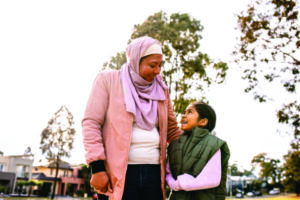 The latest report from the Poverty and Inequality Partnership, Inequality in Australia 2023: Overview, shows that wealth inequality has increased strongly over the past two decades. From 2003 to 2022, the average wealth of the highest 20% rose by 82% and that of the highest 5% rose by 86%, leaving behind the middle 20% (with a 61% increase) and the lowest 20% (with a 20% increase).
The latest report from the Poverty and Inequality Partnership, Inequality in Australia 2023: Overview, shows that wealth inequality has increased strongly over the past two decades. From 2003 to 2022, the average wealth of the highest 20% rose by 82% and that of the highest 5% rose by 86%, leaving behind the middle 20% (with a 61% increase) and the lowest 20% (with a 20% increase).
The research, undertaken by ACOSS and UNSW Sydney, shows that the average wealth of the highest 20% has grown at four times the rate of the lowest. In 2019-20, the highest 20% of households by income had average incomes of $4,306 per week after tax, five times the income of the lowest 20% ($794), and the highest 5% ($6,495) had eight times the income of the lowest 20%. The report also shows that the government’s timely pandemic response reduced income inequality, but only temporarily due to the removal of those income supports.
Dr Cassandra Goldie, CEO of ACOSS, said “Left unchecked, growing wealth inequality threatens to exacerbate and entrench generational, spatial and social divisions in our community. Governments can reverse that tide by fixing inequities in our housing and superannuation policy that disproportionately benefit those with the most.”
Royal Commission final report released
 The final report of the Royal Commission into Violence, Abuse, Neglect and Exploitation of People with Disability has been released.
The final report of the Royal Commission into Violence, Abuse, Neglect and Exploitation of People with Disability has been released.
The Royal Commission has made 222 recommendations on how to improve laws, policies, structures and practices to ensure a more inclusive and just society that supports the independence of people with disability and their right to live free from violence, abuse, neglect and exploitation.
The Royal Commission was established on 4 April 2019 following years of campaigning by the disability rights sector. The Commission’s inquiry was framed by the human rights of people with disability, as set out in the Convention on the Rights of Persons with Disabilities (CRPD).
The final report and a range of other information such as progress reports, issues papers and public hearing reports are available on the Royal Commission website.
Australia's welfare 2023
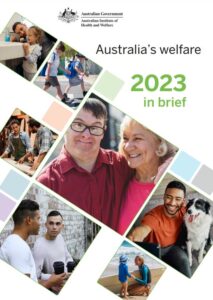 The Australian Institute of Health and Welfare has released its 16th biennial report summarising how we are faring as a nation. The report shares Australian welfare and wellbeing data with key findings on housing, education and skills, employment and income, social support, and justice and safety.
The Australian Institute of Health and Welfare has released its 16th biennial report summarising how we are faring as a nation. The report shares Australian welfare and wellbeing data with key findings on housing, education and skills, employment and income, social support, and justice and safety.
This important data collection is an excellent resource for the sector and provides an evidence base for advocacy work. The trends analysis demonstrates the short-term and long-term impacts of community services and the need for ongoing, increased investment in the sector.
In terms of workforce statistics, the report reveals that 663,000 people were employed in the welfare space in 2022 which is growing faster than total employment. Since 2012, the welfare workforce has increased by 65%. Over the same period, the total workforce grew by 20%.
The summary report is supported by an online hub which features a mix of short statistical summaries and long-form articles exploring topical welfare issues. Visit the online hub.
HILDA Survey receives funding extension
 The Minister for Social Services Amanda Rishworth has announced a funding commitment of $29.5 million to continue the HILDA survey for another few years.
The Minister for Social Services Amanda Rishworth has announced a funding commitment of $29.5 million to continue the HILDA survey for another few years.
The Household, Income and Labour Dynamics in Australia (HILDA) survey is a longitudinal study collecting information about economic and personal wellbeing, work and education experiences and family life from over 17,000 Australians each year. It commenced in 2001 and is the only study of its kind in Australia. By following the same participants over the course of their lifetime it reveals how life in Australia has changed over time.
The Department of Social Services has overall responsibility for the survey and the Melbourne Institute: Applied Economic & Social Research at the University of Melbourne is responsible for design and management of the survey.
Fair Work Ombudsman: Substitute Public Holidays in the SCHCADS Award
Public holidays can now be substituted under the Social, Community, Home Care and Disability Services (SCHCADS) Industry Award. This change follows a decision by the Fair Work Commission, the national workplace relations tribunal. It applies from the first full pay period starting on or after 11 September 2023.
Under the SCHCADS Award, an employee can now make a request to substitute a public holiday (or a part day public holiday) for a different day (or part day). If their employer agrees to the request, the substitute day will be treated as the public holiday. This means that any work performed by an employee on the replaced day is paid at their normal pay rate.
The employee then gets a paid day (or part day) off on the substitute day. If the employee works on the substitute public holiday, they’re entitled to be paid penalty rates for the time worked. Minimum entitlements for public holidays are set by the National Employment Standards.
For more information read the Fair Work Commission’s full decision and determination varying the award.
FaC Activity Newsletter – Issue 7
The Department of Social Services has published issue 7 of its Families and Children (FaC) Activity Newsletter. This issue includes information about:
- Updates on grant funding
- Review Point
- Activity Work Plans
- Program Logics
- Getting to know you!
- Survey for child, youth and parenting services
- New DEX report available
- DEX Guidance
- Website updates
- Evidence and Evaluation Support (EES)
- Child Family Community Australia (CFCA)
- Stronger ACCOs, Stronger Families Part 2
- Opportunities to participate in consultations
New ABS data reveals suicide increase
New data from the Australian Bureau of Statistics (ABS) has revealed that 3,249 Australians died by suicide in 2022, compared to 3,166 in 2021 with Victoria, South Australia, Tasmania and Northern Territory impacted most. On average, 9 people take their life each day and three quarters of those are men.
Key statistics:
In 2022:
- The median age of death by suicide was 45.6 years.
- The age-standardised suicide rate was 12.3 per 100,000 people.
- Suicide was the 15th leading cause of death.
- Men aged 45-49 had the highest rates of those aged under 80 years – 32.6 per 100,000.
- Suicide was the 2nd leading cause of death for Aboriginal and Torres Strait Islander men and 10th for females in 2022.
Suicide Prevention Australia CEO, Nieves Murray said, “Access to data is incredibly important in suicide prevention. It helps to inform how we approach suicide prevention and influences service and program delivery. Access to causes of death data is part of this picture, however, we also need more timely data on suicide attempts to better understand and respond to distress in our communities.”
Suicide Prevention Australia’s Community Tracker revealed for the first time, more than half of Australian families (56%) are reporting elevated cost-of-living distress beyond normal levels in the September Quarter – growing at three times the national average.
‘Cost-of-living and personal debt’ was the highest cause of distress for the fifth quarter in a row in the September 2023 Quarter (46%) nationally.

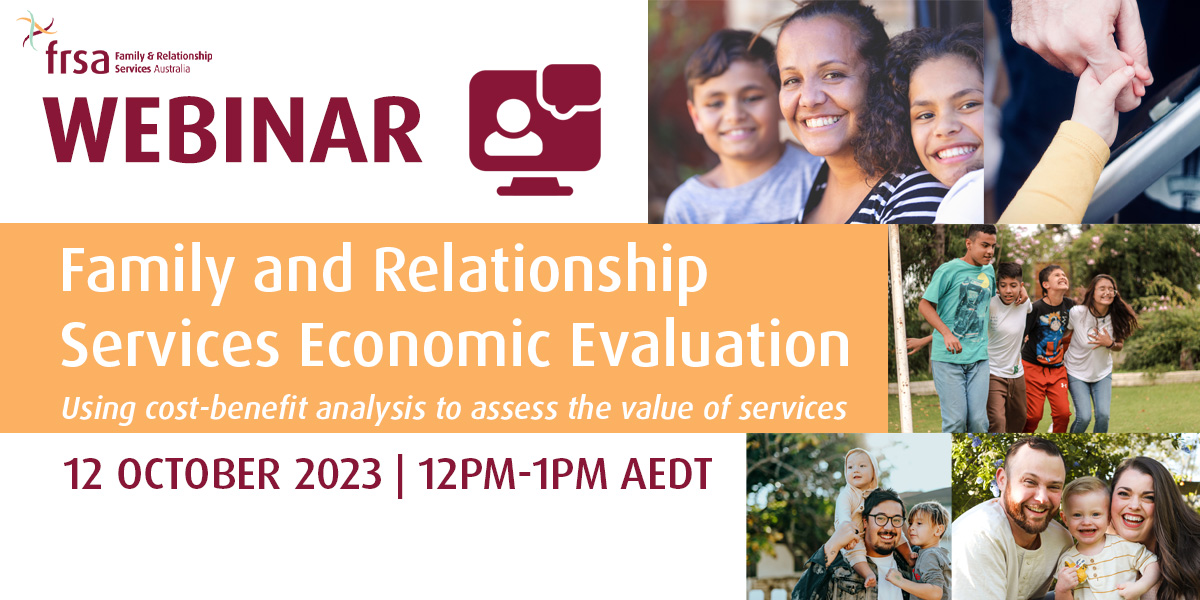
FRSA Webinar: Family and Relationship Services Economic Evaluation: Using cost-benefit analysis to assess the value of services
FRSA is hosting a webinar on Thursday, 12 October 2023 at 12:00pm-1:00pm (AEDT) presented by the Centre for International Economics (the CIE). The presentation will provide an overview of the cost-benefit analysis approach taken by the CIE for our latest report, and will outline the findings of the study.

AGD improvements to DEX data reporting
The Attorney-General’s Department is exploring whether improvements can be made to the reporting fields and guidance documents for DEX data reporting.
By now FRSA Members delivering family law services will have received an invitation from the Department to submit case studies describing (deidentified) real life instances of service delivery to separating/separated families, to help the Department understand any limitations to current reporting fields.
Participation in this consultation is, of course, completely voluntary. We encourage Members to get involved. Good data is integral to understanding the value our services deliver and we welcome the Department’s efforts to make improvements to DEX data reporting.
If you would like more information, please contact Rhiannon Walker at the Attorney-General’s Department – FamilyLawServices@ag.gov.au
Family Law Amendment Bill (No. 2) 2023 – public consultation underway
Consultation on draft family law legislation is underway. This is the second tranche of reforms to improve the family law system, with a particular emphasis on making the family law system safer for families.
The draft legislation simplifies key principles for property settlement in the Family Law Act to assist separating parties, legal representatives and the courts. Importantly, it proposes that family violence be considered as an important factor in property disputes.
The exposure draft and more information about the consultation are available on the Attorney-General’s Department website.
Submissions close 10 November 2023.
ACNC secrecy provisions reform
The Australian Government has released exposure draft legislation that amends the secrecy provisions in the Australian Charities and Not-for-profits Commission Act 2012 (ACNC Act) to allow the Australian Charities and Not‑for‑profits Commission (ACNC) to make increased disclosures regarding new and ongoing investigations.
The amendments allow the Commissioner to authorise an ACNC officer to disclose information about an ongoing investigation where the disclosure would prevent or minimise the risk of significant harm.
Submissions close 16 October 2023. Information is available on the Treasury website.
The worsening rental crisis in Australia – Interim report released
The Senate Community Affairs References Committee has released an interim report on its inquiry into the worsening rental crisis in Australia.
The Committee is yet to review all the evidence it has received and will consider possible solutions to boosting the supply of an investment in rental housing in its final report.
In the interim, the Committee has recommended that:
- the Australian Government take a coordinating role to implement stronger rental rights
- the Australian Government continue investment in public, social, community and genuinely affordable housing.
Information about the inquiry, including the interim report, is available here.
A stronger, more diverse and independent community sector – public consultation
The Department of Social Services is consulting on options to create a stronger, more diverse and independent community sector.
An issues paper has been developed that focuses on five areas:
- Giving the sector the voice and respect it deserves through a meaningful working partnership
- Providing grants that reflect the real cost of delivering quality services
- Providing longer grant agreement terms
- Ensuring grant funding flows to a greater diversity of community sector organisations (CSOs)
- Partnering with trusted community organisations with strong local links.
We are pleased that the Government recognises the integral role of the community sector in delivering services to Australian communities as well as providing a voice for those communities to feed into Government policy development.
We encourage FRSA members and stakeholders to share their expertise, ideas and insights through the submission process.
Submissions close 7 November 2023. For more information, visit DSS Engage.

FRSA Members named in the top 10 Most Innovative Companies as per Financial Review BOSS
Congratulations to FRSA Members who have made the top 10 finalists of the Financial Review’s BOSS Most Innovative Companies in the Government, Education, Not-For-Profit category.
This national competition acknowledges Australian businesses that are challenging the status quo.
- CatholicCare Sydney ranked 3rd and have been celebrated for the BariStars program run by their Disability Services team located in Belmore. Launched in November 2022, the program was initiated by Disability Services participants wanting to explore greater opportunities in the workforce. Read more.
- The Smith Family placed 9th and recognised their role in “framing public perceptions of poverty”. Their aim is to present the strengths and potential of the children and families that they support in positive ways.
- Family Life were 10th for their Community Listening Tours project. For this project they partnered with communities across five local government areas, to better understand the impact of COVID-19 on families to better inform our service design and partnerships. Read more.
Anglicare Victoria staff wins an award from Foster Care Association of Victoria
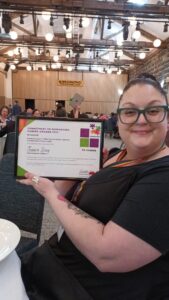 Congratulations to Anglicare Victoria staff member, Jessica Savy, on winning the prestigious Commitment to Supporting Carers Award by the Foster Care Association of Victoria.
Congratulations to Anglicare Victoria staff member, Jessica Savy, on winning the prestigious Commitment to Supporting Carers Award by the Foster Care Association of Victoria.
Jessica is a Senior Practitioner for Anglicare Victoria’s North Central Out of Home Care and she was nominated by a North Central foster carer, who had nothing but glowing praises for her, “Jessica is an incredible caseworker who goes above and beyond for not only us as carers but for our foster children as well. Jessica is truly a remarkable human. She encompasses everything a Case Manager needs and always operates with the highest integrity and professionalism.”
Communicare CEO awarded Winston Churchill Trust Fellowship
 Last month Communicare’s CEO, Melissa Perry was awarded a Winston Churchill Trust Fellowship, sponsored by the Department of Communities.
Last month Communicare’s CEO, Melissa Perry was awarded a Winston Churchill Trust Fellowship, sponsored by the Department of Communities.
A Churchill Fellowship offers Australian citizens a life-changing opportunity to travel overseas for four to eight weeks to learn more about a topic or issue that they are passionate about. Applicants are empowered to design their own projects to explore international best practice and innovation that can be applied in Australia.
Melissa’s project will investigate and identify international best practice models in domestic violence men’s behaviour change programs, specifically in residential settings, as an alternative to women and children fleeing or leaving the family home. As part of this fact finding mission, she will travel to Israel, America and the Netherlands, visiting a number of men’s behaviour change facilities.
Lutheran Care attend the South Australian Premier’s Business and Export Awards
Lutheran Care staff and Board members enjoyed a night out at the South Australian Premier’s Business and Export Awards on Friday, 22 September which celebrated the achievements of SA businesses over the past 12 months.
Lutheran Care was nominated for the Not-for-Profit Business of the Year award. While they didn’t win on the night they said, “being named a finalist in these awards is a genuine acknowledgment of our hard-working and dedicated team for the work they do in supporting vulnerable people and communities every day.”

How eSafety can support your work
The eSafety Commissioner is working to create a safer online world for children and families.
The community sector plays an important role in keeping the community safe, and eSafety can help be your ally in this. But first, eSafety needs to understand your needs.
eSafety has developed a short survey that should take no more than 10 minutes. Please tell them about the issues you observe in your community and practical tools, resources and professional learning opportunities that will benefit your work and the wider community sector.
Your answers are anonymous, and eSafety will not store your personal information. The survey closes 13 October 2023. Click here to complete the survey.
National Carers Week
National Carers Week 2023 is coming up on 15-21 October. It is a time to recognise, celebrate and raise awareness about the 2.65 million Australians who provide care and support to a family member or friend.
Help raise awareness this National Carers Week by inviting workmates, friends and family to an event to raise awareness of the diversity of carers and caring roles in Australia.
Organise a morning or afternoon tea, fundraiser or workshop to help recognise carers, identify what caring looks like, and find out what supports and services are available to carers. Click here to find out more about the week and how to get involved. And use the hashtags #NationalCarersWeek, #MillionsOfReasonsToCare and #NCW23 on social media.
Survey: Including same-sex parented families in early childhood settings: Perspectives of practitioners and parents
This study conducted by PhD researchers at Macquarie University, aims to understand your perspectives on including same-sex parented families in early childhood settings as a practitioner or as a parent/guardian.
By completing this survey, you have the opportunity to have a voice in how children from diverse family structures can be supported in early childhood settings. Participating in this study may also benefit you by reflecting on your role in contributing to non-discriminatory early childhood education for all children and families.
Completing this survey gives participants a chance to win an AU$100 gift card. The survey closes 8 October 2023. Click here to complete the survey.
Anti-Poverty Weeks 2023
 For more than 20 years Anti-Poverty Week has campaigned to make sure that all Australians including our children can cover the basics and have a secure roof over their heads. Children can thrive and be healthy when they have what they need to develop well. This year Anti-Poverty Weeks is running over two weeks from 15 to 27 October 2023.
For more than 20 years Anti-Poverty Week has campaigned to make sure that all Australians including our children can cover the basics and have a secure roof over their heads. Children can thrive and be healthy when they have what they need to develop well. This year Anti-Poverty Weeks is running over two weeks from 15 to 27 October 2023.
More than 1 in 6 Australian children are growing up in poverty. Growing up in poverty is simply bad for children, it diminishes their physical and mental health, reduces their readiness for school and attainment in school, and the effects can last well into adulthood. Let’s make sure that all Australian children and families can cover the basics and have a secure roof over their heads. All children can thrive and be healthy when they have what they need to develop well.
Register your Anti-Poverty Week event or download a range of resources from the APW website.
Grant: Safe Places Emergency Accommodation Inclusion Round
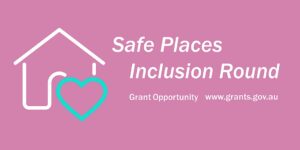 The Australian Government is inviting organisations via an open, competitive grant process to apply for the Safe Places Inclusion Round.
The Australian Government is inviting organisations via an open, competitive grant process to apply for the Safe Places Inclusion Round.
The Inclusion Round provides capital works grants for the renovation, building or purchase of new or expanded emergency accommodation for women and children experiencing family and domestic violence.
It will focus on improving access to appropriate emergency accommodation for First Nations women and children, women and children from culturally and linguistically diverse backgrounds, and women and children with disability, however, all women and children, regardless of identity, must be provided with accommodation or referral.
The department will hold information sessions in early October 2023. The information sessions will provide guidance on the Grant Opportunity Guidelines, eligibility and assessment criteria, and an opportunity to ask questions. You can register for an information session on Eventbrite.
Applications close 9:00 pm AEDT on Tuesday 14 November 2023. Find out more on GrantConnect.
Effective Online Group Leadership Workshop
SUNSHINE CIRCLES – Albury
SUNSHINE CIRCLES – Shepparton
Webinar: Supporting children’s wellbeing when working with separating parents | 25 October 2023 | 1:00pm – 2:00pm (AEDT)
This webinar is co-produced by the Australian Institute of Family Studies and Emerging Minds and will explore how practitioners can make children’s wellbeing central to conversations with parents who are navigating separation and/or divorce.
VIC
Senior Kids in Focus Case Manager | Odyssey House Victoria
NSW
Aboriginal Early Childhood Educator | CatholicCare Wilcannia-Forbes
Eating Disorders Clinician headspace Wagga Wagga | Relationships Australia Canberra & Region
Mental Health Clinician headspace Wagga Wagga | Relationships Australia Canberra & Region
QLD
Placement Worker | UnitingCare Community
Child & Adolescent & Family Counsellor | UnitingCare Community
VIC
Team Leader Family Relationship Centre | Mallee Family Care
Family Dispute Resolution Practitioner (FDRP) | Mallee Family Care
If you have any events you’d like listed on the FRSA Events and Training Calendar or job vacancies you’d like listed on the FRSA Jobs Board, email Communications Officer, Vanessa Lam at communications@frsa.org.au. Please note that posting onto the FRSA website is reserved for FRSA Members only.

Trialling a nature-based intervention with men who perpetrate domestic and family violence | Australian Institute of Criminology
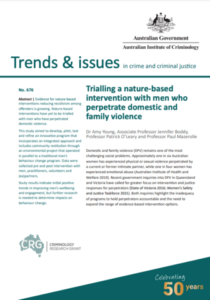 This report describes findings from a study looking into nature-based interventions with men who have perpetrated domestic violence. The study aimed to pilot and test a program that utilised an integrated approach with a community environmental project operating and a traditional men’s behaviour change program.
This report describes findings from a study looking into nature-based interventions with men who have perpetrated domestic violence. The study aimed to pilot and test a program that utilised an integrated approach with a community environmental project operating and a traditional men’s behaviour change program.
Adolescent violence in the home – Prevalence, service responses and the intersection with disability | ANROWS
This webinar recording begins with three evidence presentations on the latest research on adolescent violence in the home (AVITH), followed by a panel discussion with youth advocates, policymakers, sector experts and practitioners across the youth and legal sectors. It focuses on the prevalence and nature of AVITH; the intersection of AVITH and young people with disability; how services could use a collaborative response to support young people and families experiencing AVITH; and, crucially, the support needs that young people themselves have identified.
Take notice, believe us and act! | Commission of Inquiry into the Tasmanian Government’s responses to child sexual abuse in institutional settings
This report is based on the views of 59 children and young people in Tasmanian government-run public schools, out-of-home care, hospitals and youth detention. Researchers Associate Prof Tim Moore and Emeritus Prof Morag McArthur highlight serious systemic problems which put children’s safety at risk. Children told them that some adults failed to act to keep them safe, did not respond adequately, felt unsettled due to constant changes in placements and staff, and experienced maltreatment by adults or peers. Also, none of the Aboriginal or Torres Strait Islander participants could identify ways organisations were ensuring their cultural safety. These failings show the need for major systemic change. The culture of not believing children must shift to one of true listening and response.
ACCC Childcare inquiry: interim report September 2023 | Australian Competition and Consumer Commission
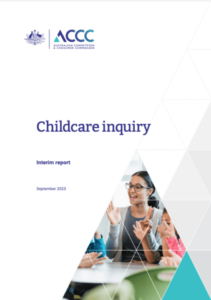 This second interim report makes draft findings and recommendations regarding the costs of providing childcare services, the nature of competition in childcare markets, the profitability and viability of the sector, and the effectiveness of Australia’s existing price regulation mechanisms in aiding affordability of childcare.
This second interim report makes draft findings and recommendations regarding the costs of providing childcare services, the nature of competition in childcare markets, the profitability and viability of the sector, and the effectiveness of Australia’s existing price regulation mechanisms in aiding affordability of childcare.
Cultural diversity in the 47th Parliament: a quick guide | Parliament of Australia
This Quick Guide provides information about parliamentarians who identify as having non-English speaking ancestry and who have served in the current, 47th, Parliament. This paper aims to provide only an approximation of the cultural diversity of the Australian Parliament, as ancestry does not necessarily equate to cultural or ethnic identity.
Accidental, unsolicited and in your face | eSafety Commissioner
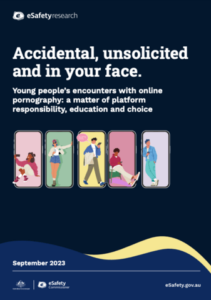 In September 2022, eSafety carried out mixed methods research into young people’s attitudes towards online pornography and age assurance. This report starts by examining young people’s encounters with online pornography. It then explores young people’s perspectives on and attitudes towards online pornography, including what they consider helpful for reducing its negative impacts.
In September 2022, eSafety carried out mixed methods research into young people’s attitudes towards online pornography and age assurance. This report starts by examining young people’s encounters with online pornography. It then explores young people’s perspectives on and attitudes towards online pornography, including what they consider helpful for reducing its negative impacts.
Mandatory reporting of child abuse and neglect | Child Family Community Australia
This resource sheet provides information on mandatory reporting laws, which require specified people to report designated types of suspected child maltreatment to specified state or territory authorities. It provides answers to common questions about mandatory reporting and covers the mandatory reporting legislation across all Australian jurisdictions.
Crisis accommodation in Australia: now and for the future | Australian Housing and Urban Research Institute
 This research explores the different crisis accommodation models operating in Australia, as well as the different approaches to case management and key principles for ensuring a supportive built environment.
This research explores the different crisis accommodation models operating in Australia, as well as the different approaches to case management and key principles for ensuring a supportive built environment.
First Nations care leavers: Supporting better transitions | Australian Institute of Family Studies
This resource aims to support you to start building awareness of how individual and systemic practices impact First Nations young people and families.
It also provides practical guidance for providing culturally safe services and how organisations can become more engaged with First Nations organisations, staff, Elders and community members.
Migrant and refugee women in Australia: A study of sexual harassment in the workplace | ANROWS
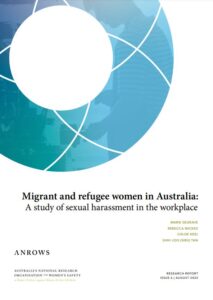 This is the first national study of migrant and refugee women’s experiences, understandings and responses to workplace sexual harassment of its type. The research found that just under half (46%) of the migrant and refugee women in this study had experienced at least one form of sexual harassment in the workplace in the last 5 years in Australia.
This is the first national study of migrant and refugee women’s experiences, understandings and responses to workplace sexual harassment of its type. The research found that just under half (46%) of the migrant and refugee women in this study had experienced at least one form of sexual harassment in the workplace in the last 5 years in Australia.
Who was looking after me? Prioritising the safety of Tasmanian children | Commission of Inquiry into the Tasmanian Government’s Responses to Child Sexual Abuse in Institutional Settings
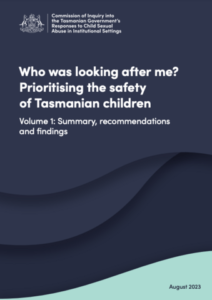 This Commission of Inquiry was prompted by a groundswell of community concern in 2019–20 over child sexual abuse in Tasmanian Government institutions. It followed media reporting of incidents of abuse and inadequacies in the Government’s response to these incidents.
This Commission of Inquiry was prompted by a groundswell of community concern in 2019–20 over child sexual abuse in Tasmanian Government institutions. It followed media reporting of incidents of abuse and inadequacies in the Government’s response to these incidents.
Person-Centred Practice Guide in the homelessness sector | Council to Homeless Persons
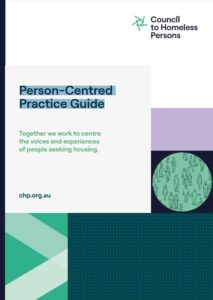 This is a person-centred practice guide to assist practitioners in the Specialist Homelessness Sector. The guide is designed to give rise to a shared understanding of what a person-centred approach is and how to integrate it into current practice.
This is a person-centred practice guide to assist practitioners in the Specialist Homelessness Sector. The guide is designed to give rise to a shared understanding of what a person-centred approach is and how to integrate it into current practice.
Family violence and sexual harm: research report 2023 | RMIT University
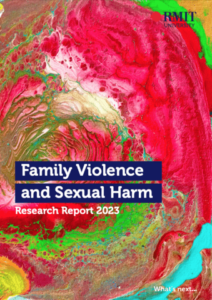 While much national and international literature recognises the intersections of family violence and sexual harm, there is as yet little research and policy within Australia generally, or within Victoria, that addresses the co-occurrence of family violence and sexual harm experienced by adult victim/survivors. This research begins to address this important evidence gap.
While much national and international literature recognises the intersections of family violence and sexual harm, there is as yet little research and policy within Australia generally, or within Victoria, that addresses the co-occurrence of family violence and sexual harm experienced by adult victim/survivors. This research begins to address this important evidence gap.
Want to submit something to the FRSA eBulletin?
If you have an news item or event that you would like to be featured in a future eBulletin please submit your announcement via the form below or email communications@frsa.org.au with the subject “FRSA eBulletin submission”.
Please note FRSA members receive priority for items posted in the eBulletin. And to keep information current, relevant and useful, submissions will not be repeated from week to week.
Subscribe
Subscribe to receive future eBulletin editions directly to your inbox!








